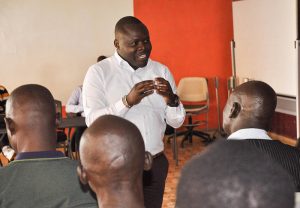Eddy Oketch MA ’16 is shaking up Kenya’s Senate in more ways than one. Not only is he paving the way for young Kenyans to engage in politics, he’s also bringing an increasingly pressing issue to the fore: climate change.

Eddy Oketch MA ’16 is shaking up Kenya’s Senate in more ways than one. Not only is he paving the way for young Kenyans to engage in politics, he’s also bringing an increasingly pressing issue to the fore: climate change.

Like many young people who grew up in rural Kenya, Eddy Oketch never pictured himself as a politician. But when he saw the opportunity to make a difference in his community by serving in the country’s Senate, Oketch jumped at the chance.
Today, the Yale Jackson alum represents the 1.2 million people of Migori County. At age 31, he is one of the youngest senators in the chamber. Through his service, Oketch hopes to inspire other young people to play an active role in Kenyan politics.
He believes that many talented young Kenyans are deterred from running for elected office because they lack the resources and networks of older political candidates.
Another reason many Kenyans don’t run for office is the stigma associated with corrupt politicians. The opportunity to address this problem was a key motivator for Oketch.
“I never desired to be a politician, but when I saw that oversight and accountability need to be strengthened in our executive systems, I decided to run for Senate,” Oketch explained.
Oketch is also passionate about combatting climate change, and believes that government policy is the primary avenue for creating improvements in this area. Since his election in early August, Oketch has been working to establish a parliamentary committee on climate action. His aim is to increase the visibility of climate issues in the Senate and propose new legislation that tackles pressing environmental issues, such as implementing better waste disposal systems.
Long before running for office, Oketch was interested in finding creative ways to combat climate change in his community. He founded Treeco Fund in 2018, an innovative social venture that is addressing climate change and rural poverty simultaneously. The fund works with Kenyan farmers to increase the productivity of their farms through agro- and micro-forestry. Farmers receive a guaranteed minimum income of $365-$1,000 per year, representing $1 for each tree they plant and keep alive on their farms. This is a substantial sum for farming households that currently subsist on less than $1 a day.
Treeco’s model also ensures that farmers share in the income that is generated from the sale of the trees’ products once they reach maturity or become productive, further increasing the earnings potential of the farmers. With time, Treeco aims to transition to revenue that is generated from selling carbon credits.
“In a country like Kenya, we need to have a more circular economy, whereby it’s not a linear model of production where people are producing, using, and disposing. We need to… [develop] policies that allow people to have sustainable production,” Oketch said. He cites Rwanda’s move to ban plastic bags in 2008 as an example of a policy that can be used to transition African economies to more sustainable production practices.
“Just by virtue of starting to control our own [environmental practices and policies], [this] can lead to [more impactful] engagement with multinationals that are engaged in the production chain… the ultimate scale of that change must happen at a policy level,” Oketch explained.
Oketch attributes aspects of his approach to problem-solving to his time spent as a graduate student at the Yale Jackson School. As a student, Oketch felt he had much to learn from his peers and faculty members who had tackled real-life problems in their own communities, people Oketch refers to as ‘do-ers’.

“All these people are dealing with global challenges that affect my country, but then, they [bring in perspectives and experiences from] different contexts and you can see the way they have gone through devising solutions in their context. Some of the solutions can be borrowed to be contextualized in my community. So that’s something I really appreciate about Jackson,” Oketch said.
Oketch liked how the small size of the Jackson program allowed him to closely interact with the other students and faculty. Oketch particularly appreciated his interactions with Jackson’s Senior Fellows, practitioners who come to Jackson to teach courses and mentor students. They “teach you from a practical point of view, not from the context of textbooks and academic engagement,” he said.
“That practical measure of teaching changed my way of thinking about solutions in the world immensely,” Oketch added.
His advice for students thinking about a career in politics? Commit yourself to service.
Commitment to service is a value that was instilled in Oketch by his mother, who taught him that service to others is the most important duty in life. After his mother passed away when he was young, Oketch dedicated himself to caring for his seven siblings.
For Oketch, family is key to staying on the right path in life. “The biggest anchor for politics… is to invest in your family. When it becomes very overwhelming, your family becomes your guiding star,” he said.
“The family are the first people who will remind you of who you are, and they will anchor your vision on your values.”